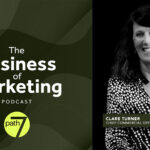By Caroline Davison, Managing Director and Sustainability Lead, ELVIS
ELVIS has just joined a small but growing number of UK agencies who have achieved B Corp certification. It was the result of two years of focused determination to pivot an 18-year-old business that followed a traditional shareholder model into one that actively and equally considers people and planet alongside profit.
The B Corp certification process involves the examination of every part of your business under the themes of ‘governance’, ‘workers’, ‘environment’, ‘customers’ and ‘community’. Unsurprisingly it is pretty thorough and there are hundreds of questions that form part of the assessment process.
We publicly announced our intention to become a B Corp in 2022 back at the start of 2020 – in industry publications such as this one, on our website and to our clients, suppliers and friends. And because of this, over the last two years we have had a steady stream of people reach out to us, all at different stages of their B Corp journey, to ask about our approach and learnings, which we have been happy to share. Ultimately B Corp is about systemic change and the more businesses working towards B Corp certification, the closer we are collectively to achieving that goal.
We’re calling on other agencies across the industry to start their B Corp journey and as such, I’d like to share six key pieces of practical advice for those who want to achieve the certification.
- Engage all staff upfront. B Corp certification isn’t something a sustainability team or diversity committee alone can achieve. It’s about fundamental change across your business, so your whole business needs to engage with it. If it sits with one small group of people, what happens when those people aren’t in a meeting or when they leave the agency?
- Identify a board-level lead or sponsor. This should be someone who has the mandate to enact change and a comprehensive understanding of the B Corp assessment. A common theme in the calls I had with other B Corp hopefuls was that senior management were underestimating the requirements and those that were trying to achieve certification simply didn’t have the authority to do what was required.
- Set a realistic timeline. Whilst the exact time required will depend on the base level your agency is starting from plus its size and complexity, I can tell you it takes longer than you think. The sense of panic in some of the conversations I’ve had with others has been palpable – a submission date being set by the board which the ‘delivery’ team have realised they can’t hit. Usually, it seems this date is arbitrarily set at one year. We allowed two-and-a-half years. And we needed it.
- Do an initial online assessment to work out your base level score. This is invaluable in helping you to work out where to focus. The number of questions can seem overwhelming to start with, especially when you realise one question doesn’t equal one point – to pass you need to answer strongly far more than 80 questions. This first pass acts as your best guess of where you are at even if you don’t have all the answers to hand, highlighting both the width and breadth of your information gaps. If you are owned by a holding company it also helps you to identify where you will need their input.
- Build up your supporting documentation as you go. B Corp don’t ask for evidence to be uploaded at the point at which you submit but you will need it as part of the validation stage. To remove as much stress from the process as possible, you should avoid the mammoth task of collating everything at the end of the process.
- If at first you don’t succeed… Know that even if it takes longer than you first thought or if you don’t manage to gain certification on your first attempt, undertaking the B Corp journey means your agency will be a better agency than when you started, regardless.
Good luck.






